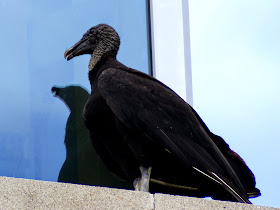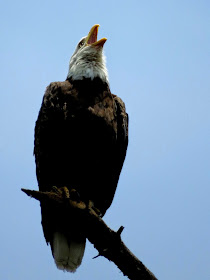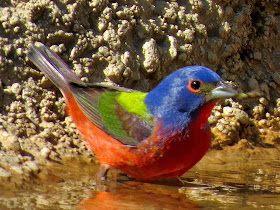.
It hasn't been too busy bird-wise since I got back from our Junction trip. Common Nighthawks occasionally fly over the parking lots. Our Western Kingbirds must be nesting because they are not very visible or audible at present. As usual, Black-bellied Whistling Ducks turn up all over the campus.
I'm hoping that later in the summer I'll see Whistling Ducks bringing their ducklings to the retention ponds. In the meantime I'll have to make do with the Mallard who is giving her brood swimming lessons there.
Meanwhile we have seen the return of the Black Vulture that likes admiring itself in the Library windows.
At home our resident birds are all raising young. I haven't yet managed to get photos of most of the juveniles - including Downy and Red-bellied Woodpeckers - but a couple of young Northern Cardinals haven't been so elusive.
Our House Finches seem to have just one baby.
It has been so busy at the feeders that birds sometimes have to line up on the shed roof waiting their turn, like this Tufted Titmice.
Down at the Longwood retention pond the two young Bald Eagles have fledged. However, one was still hanging around the nest.
An adult lurked nearby to keep an eye on the youngster.
I'm not sure whether all the calling was aimed at me or the eaglet or something else. It was impressively loud, though.
At the weekend I'll go back to the pond to see if I can get a look at the other adult and the older juvenile.
.
Jeff Mohamed blogs about birds and other wildlife in the Houston area - and occasionally farther afield.
Thursday, May 29, 2014
Tuesday, May 27, 2014
South Llano River State Park: The Final Morning
.
I was out early on Sunday to fit in a couple of hours birding in the state park before the drive home.
It was a dark and cold morning and few birds except Black-crested Titmice were visible at the Acorn Blind.
A walk down to the river produced few birds, apart from Turkey and Black Vultures.
However, by the time I got back to Acorn Blind, things were starting to look up. A female Summer Tanager appeared.
Then a Yellow Warbler.
Finally, a new bird: male Indigo Bunting.
He decided to bathe.
Another yellow bird was hopping around in the bushes: Bell's Vireo.
On my walk to the car, a Summer Tanager perched on a sign was totally unconcerned by my presence.
As I was leaving the park, I stopped at Lora's Blind. As usual, it was busy with sparrows, including a Field Sparrow that allowed several photos.
A Western Scrub Jay was busily looking for seeds.
An English couple already in the blind told me that they had seen a Wild Turkey just before I arrived. Five minutes later the bird re-appeared. It was the only Turkey I saw during our trip.
Back at the motel, Dee had been trying to evict a scorpion from our room, in case it stung Petra. Unfortunately, she wasn't able to trap it and so she had no choice but to kill it instead. A rather sad end to what was otherwise a great short trip.
.
I was out early on Sunday to fit in a couple of hours birding in the state park before the drive home.
It was a dark and cold morning and few birds except Black-crested Titmice were visible at the Acorn Blind.
A walk down to the river produced few birds, apart from Turkey and Black Vultures.
However, by the time I got back to Acorn Blind, things were starting to look up. A female Summer Tanager appeared.
Then a Yellow Warbler.
Finally, a new bird: male Indigo Bunting.
He decided to bathe.
Another yellow bird was hopping around in the bushes: Bell's Vireo.
On my walk to the car, a Summer Tanager perched on a sign was totally unconcerned by my presence.
As I was leaving the park, I stopped at Lora's Blind. As usual, it was busy with sparrows, including a Field Sparrow that allowed several photos.
A Western Scrub Jay was busily looking for seeds.
An English couple already in the blind told me that they had seen a Wild Turkey just before I arrived. Five minutes later the bird re-appeared. It was the only Turkey I saw during our trip.
Back at the motel, Dee had been trying to evict a scorpion from our room, in case it stung Petra. Unfortunately, she wasn't able to trap it and so she had no choice but to kill it instead. A rather sad end to what was otherwise a great short trip.
.
Saturday, May 24, 2014
South Llano River State Park: Day 2 (Afternoon: Part 2)
.
We started our late afternoon visit to the state park at the Acorn Blind. Although we didn't see a single new species, we had an enjoyable time watching a succession of birds come to bathe.
A male Painted Bunting was first in the water.
The second bird up was a male Northern Cardinal.
A Field Sparrow watched the Cardinal bathing for a while and even tried to bathe next to it.
In the end, though, the Field Sparrow decided to wait until it had the water all to itself.
A stunning male Summer Tanager flew in but, unfortunately, it decided it didn't need a bath.
After a while, we wandered over to the Agarita Blind, where we again saw the normal selection of Painted Buntings, Black-crested Titmice, Lark Sparrows, Black-chinned Hummingbirds etc.
Some other birders in the blind told us that we might see more if we walked down to the river, where they had recently seen Black-capped Vireos and several other species. So off we went.
As we passed through the main campground, we stopped to watch more Ladder-backed Woodpeckers.
We also saw the first Inca Doves of our trip.
When we were by the side of Buck Lake, Deanne spotted another new bird for the trip: Yellow Warbler. However, it disappeared before I could even raise my camera.
The pecan grove had numerous Golden-fronted Woodpeckers and a single Black-capped Vireo but I wasn't able to get photos of any of them.
I was luckier when we reached the river bank. Ash-throated Flycatchers were nesting in an abandoned woodpecker hole, and one of them perched above the nest, holding a bug it had caught.
I've always thought that the Houston area was very buggy. However, I've never seen as many birds snacking on bugs as I saw last weekend in the Junction area.
By the time we made the walk back to the campground, we were feeling tired and so we decided to call it a day. All being well, I intended to fit in another couple of hours at the park the next morning, before we started the drive back home.
.
We started our late afternoon visit to the state park at the Acorn Blind. Although we didn't see a single new species, we had an enjoyable time watching a succession of birds come to bathe.
A male Painted Bunting was first in the water.
The second bird up was a male Northern Cardinal.
A Field Sparrow watched the Cardinal bathing for a while and even tried to bathe next to it.
After a while, we wandered over to the Agarita Blind, where we again saw the normal selection of Painted Buntings, Black-crested Titmice, Lark Sparrows, Black-chinned Hummingbirds etc.
Some other birders in the blind told us that we might see more if we walked down to the river, where they had recently seen Black-capped Vireos and several other species. So off we went.
As we passed through the main campground, we stopped to watch more Ladder-backed Woodpeckers.
We also saw the first Inca Doves of our trip.
When we were by the side of Buck Lake, Deanne spotted another new bird for the trip: Yellow Warbler. However, it disappeared before I could even raise my camera.
The pecan grove had numerous Golden-fronted Woodpeckers and a single Black-capped Vireo but I wasn't able to get photos of any of them.
I was luckier when we reached the river bank. Ash-throated Flycatchers were nesting in an abandoned woodpecker hole, and one of them perched above the nest, holding a bug it had caught.
I've always thought that the Houston area was very buggy. However, I've never seen as many birds snacking on bugs as I saw last weekend in the Junction area.
By the time we made the walk back to the campground, we were feeling tired and so we decided to call it a day. All being well, I intended to fit in another couple of hours at the park the next morning, before we started the drive back home.
.
Thursday, May 22, 2014
South Llano River State Park: Day 2 (Afternoon: Part 1)
.
After brunch we went back to spend a little time at Lora's Blind, which we hadn't visited in the morning.
The blind is situated near an old barn.
The cactuses, thistles and other plants were in bloom.
Lizards were scooting around on the ground.
Ants were everywhere - and some of them were BIG.
Two Black Vultures did some synchronized flying above us.
The feeders had the usual birds, including Lark and Field Sparrows, Painted Buntings and Black-crested Titmouse (below).
Western Scrub-Jays gave us very good looks.
A female Summer Tanager approached the water feeder very shyly.
When she finally gathered up the nerve to try the water, she seemed to resent the presence of a male Northern Cardinal.
As soon as he moved, she got down to the serious business of bathing.
Dee was ready for a rest by now, so I dropped her off at the motel before driving on a country road to the Junction wastewater plant. On the way I had to slow down to allow a Greater Roadrunner to cross the road.
I was disappointed to see that the pond that had held several shorebirds two days earlier was now almost dry. The only birds on it were a Killdeer, a couple of White-rumped Sandpipers and Least Sandpipers (below).
I walked the perimeter of the plant, hoping for Yellow-headed Blackbirds. I wasn't successful. Instead I saw many Cliff Swallows and Red-winged Blackbirds, plus a couple of Bell's Vireos (below).
A quick visit to the city park was't much more productive, turning up only Eastern Wood-Pewee, Vermilion Flycatcher, Bronzed Cowbird and Western Kingbird (below).
After that, it was time for a quick rest at the motel before returning to the state park to see if we could spot any different bird species.
.
After brunch we went back to spend a little time at Lora's Blind, which we hadn't visited in the morning.
The blind is situated near an old barn.
The cactuses, thistles and other plants were in bloom.
Lizards were scooting around on the ground.
Ants were everywhere - and some of them were BIG.
Two Black Vultures did some synchronized flying above us.
The feeders had the usual birds, including Lark and Field Sparrows, Painted Buntings and Black-crested Titmouse (below).
Western Scrub-Jays gave us very good looks.
When she finally gathered up the nerve to try the water, she seemed to resent the presence of a male Northern Cardinal.
As soon as he moved, she got down to the serious business of bathing.
Dee was ready for a rest by now, so I dropped her off at the motel before driving on a country road to the Junction wastewater plant. On the way I had to slow down to allow a Greater Roadrunner to cross the road.
I was disappointed to see that the pond that had held several shorebirds two days earlier was now almost dry. The only birds on it were a Killdeer, a couple of White-rumped Sandpipers and Least Sandpipers (below).
I walked the perimeter of the plant, hoping for Yellow-headed Blackbirds. I wasn't successful. Instead I saw many Cliff Swallows and Red-winged Blackbirds, plus a couple of Bell's Vireos (below).
A quick visit to the city park was't much more productive, turning up only Eastern Wood-Pewee, Vermilion Flycatcher, Bronzed Cowbird and Western Kingbird (below).
After that, it was time for a quick rest at the motel before returning to the state park to see if we could spot any different bird species.
.
























































